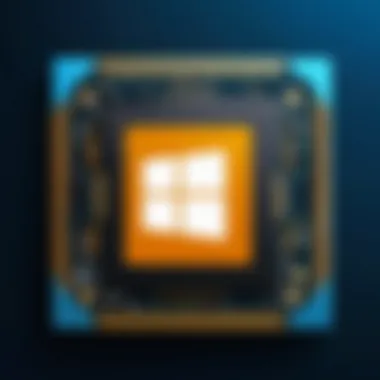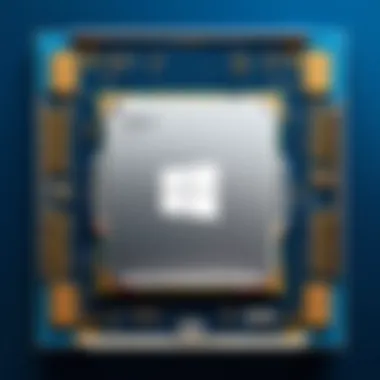Unveiling CPU Compatibility with Windows 11: A Detailed Exploration


Hardware Testing
When delving into the compatibility of CPUs with the new Windows 11 operating system, one critical aspect to consider is how different hardware configurations interact with the software. In this section, we will explore the nuances of hardware testing, focusing on the reviews of gaming monitors, performance analysis of GPUs, and comparisons of mechanical keyboards.
Reviews of Gaming Monitors
Gaming monitors play a pivotal role in enhancing the visual experience of gaming enthusiasts. Through rigorous testing and evaluation, we aim to provide in-depth reviews of various gaming monitors currently available in the market. Detailed assessments will cover aspects such as refresh rates, resolution, panel types, response times, and color accuracy. By scrutinizing these key features, readers can make informed decisions when selecting a monitor that complements their CPU for an optimized Windows 11 gaming experience.
Performance Analysis of GPUs
Graphics Processing Units (GPUs) are instrumental in rendering graphics-intensive applications smoothly. Our performance analysis will involve benchmarking different GPUs to assess their compatibility and effectiveness with Windows 11. By examining factors like CUDA cores, VRAM capacity, memory bandwidth, and thermal performance, readers can discern which GPU aligns best with their CPU to unlock the full potential of Windows 11 features.
Comparison of Mechanical Keyboards
In the realm of PC gaming, the keyboard serves as a primary interface for interaction. Mechanical keyboards are favored for their tactile feedback and durability, but not all are created equal. Through detailed comparisons, we will evaluate various mechanical keyboards in terms of key switch types, actuation force, lifespan, backlighting options, and programmable features. This analysis assists readers in selecting a compatible mechanical keyboard that complements their CPU setup, enhancing both gaming performance and overall user experience.
Introduction
In the realm of technology, the compatibility of Central Processing Units (CPUs) with operating systems holds paramount importance, especially with the advent of contemporary innovations like Windows 11. As we navigate through the intricate landscape of CPUs that seamlessly integrate with Windows 11, it becomes apparent that the underpinning hardware requisites play a pivotal role in determining the system's efficiency and performance. This exploration brings to light the fundamental aspects of CPU compatibility with Windows 11 and sheds light on the essential factors that drive this symbiotic relationship. By dissecting the nuances of CPU architecture, generation specificity, TPM 2.0 support, and Secure Boot capability, enthusiasts and users alike gain a profound understanding of the intricate mechanisms that facilitate a harmonious coexistence between CPUs and Windows 11. This meticulous analysis aims to empower readers with the knowledge required to make informed decisions regarding CPU selections for optimal system functionality and performance.
Understanding CPU Compatibility
In this section, we delve into the crucial topic of understanding CPU compatibility concerning Windows 11. A deep comprehension of this aspect is pivotal for users aiming to optimize their system's performance with the latest operating system. By grasping the nuances of CPU compatibility, readers can make informed decisions regarding their hardware configurations, ensuring a smooth Windows 11 experience.
Essential Factors to Consider


Processor Generation
Processor generation holds paramount importance when considering CPU compatibility with Windows 11. The generation of a processor dictates its performance capabilities, feature set, and overall suitability for the operating system. Newer processor generations often incorporate advancements in technology, enhancing speed, efficiency, and security features. This article emphasizes the significance of selecting a compatible processor generation to leverage the best performance benefits while using Windows 11.
CPU Architecture
The CPU architecture plays a crucial role in determining the efficiency and functionality of a processor within the Windows 11 ecosystem. Different CPU architectures offer varying levels of performance, power consumption, and thermal management. Understanding the nuances of CPU architecture is essential for users seeking an optimal computing experience with Windows 11. This section provides detailed insights into the impact of CPU architecture on system performance and compatibility.
TPM 2. Support
TPM 2.0 support is a critical aspect to consider when assessing CPU compatibility with Windows 11. Trusted Platform Module (TPM) enhances system security by providing hardware-based security functions. Windows 11 mandates TPM 2.0 support for installation, ensuring a secure computing environment. Readers will gain a comprehensive understanding of the importance of TPM 2.0 support and its implications for Windows 11 compatibility in this detailed exploration.
Secure Boot Capability
Secure Boot capability is another key factor influencing CPU compatibility with Windows 11. Secure Boot technology ensures that only verified components are allowed to run during system startup, enhancing security and preventing malware attacks. This section elucidates the role of Secure Boot capability in ensuring a secure boot process with Windows 11, underscoring its significance in the realm of CPU compatibility and system integrity.
Windows CPU List
Intel Processors
Intel Core i7-11xxx
Delving into the Intel Core i7-11xxx processor unveils its crucial role in powering systems efficiently. Renowned for its exceptional performance capabilities, the Intel Core i7-11xxx stands out due to its high processing speed and seamless multitasking abilities. The key characteristic of the Intel Core i7-11xxx lies in its ability to handle resource-intensive tasks with remarkable ease, making it a sought-after choice for demanding computing needs. However, while the Intel Core i7-11xxx shines in performance, its higher price point and power consumption may pose some disadvantages for users looking for budget-friendly or energy-efficient options.
Intel Core i5-11xxx


Considering the Intel Core i5-11xxx brings to light its optimum balance between performance and affordability. This processor is renowned for its solid performance in handling everyday tasks with efficiency. The key characteristic of the Intel Core i5-11xxx is its ability to deliver a seamless computing experience for casual users, striking a balance between speed and cost-effectiveness. While being a popular choice for users seeking a reliable and affordable processor, the Intel Core i5-11xxx may exhibit limitations in handling extensive multitasking or high-end gaming requirements.
Intel Core i3-11xxx
Exploring the Intel Core i3-11xxx sheds light on its suitability for entry-level computing needs. The Intel Core i3-11xxx is distinguished by its cost-effective nature and adequate performance for basic tasks. The key characteristic of the Intel Core i3-11xxx lies in its accessibility for casual users looking for a budget-friendly option without compromising significant performance. While the Intel Core i3-11xxx serves as an ideal entry-level processor, it may lack the processing power required for intensive tasks or advanced gaming experiences.
AMD Processors
AMD Ryzen
Analyzing the AMD Ryzen 9 processor unveils its unmatched performance capabilities for demanding computing tasks. The key characteristic of the AMD Ryzen 9 lies in its exceptional multitasking abilities and superior gaming performance, making it a preferred choice for enthusiasts seeking top-tier processing power. However, while the AMD Ryzen 9 excels in performance, its relatively higher price point and power consumption may present challenges for users with budget constraints or energy efficiency priorities.
AMD Ryzen
Considering the AMD Ryzen 7 processor showcases its prowess in delivering solid performance for various computing needs. The key characteristic of the AMD Ryzen 7 is its balance between performance and cost-effectiveness, catering to users looking for a reliable processor without breaking the bank. While the AMD Ryzen 7 is popular among users seeking a versatile and reasonably priced processor, it may not match the top-tier performance of higher-end models for intensive tasks or gaming experiences.
AMD Ryzen
Exploring the AMD Ryzen 5 processor reveals its capabilities in providing a dependable computing experience for everyday use. The key characteristic of the AMD Ryzen 5 lies in its optimal balance between performance and affordability, making it a popular choice for users with moderate processing needs. While the AMD Ryzen 5 excels in offering a cost-effective solution with adequate performance, it may not deliver the same level of power and multitasking prowess as higher-end models, limiting its suitability for intensive workloads or demanding gaming requirements.
Choosing the Right CPU for Windows
In the complex ecosystem of Windows 11, selecting the appropriate CPU is of paramount importance. The optimization between the operating system and the CPU can significantly impact the overall performance and user experience. Compatibility between Windows 11 and the CPU ensures seamless functionality and maximizes the system's capabilities. Choosing the right CPU involves a careful analysis of processor specifications, such as core count, clock speed, and cache size, to meet the specific requirements of the user. Gaming enthusiasts, content creators, and casual users each have distinct demands that necessitate tailored CPU selection.
Matching Performance Needs


Gaming Enthusiasts
Gaming enthusiasts prioritize high processing power and graphic performance to deliver smooth gameplay and immersive visuals. CPUs with multiple cores and high clock speeds are favored for handling resource-intensive gaming applications. These enthusiasts often opt for unlocked processors that allow for overclocking, enhancing gaming performance. The ability of the CPU to swiftly execute commands and render complex graphics is crucial for delivering an unparalleled gaming experience.
Content Creators
Content creators rely on CPUs with excellent multi-threading capabilities and efficient task handling to seamlessly edit videos, render animations, or manipulate high-resolution images. Processors with high core counts and strong single-core performance are ideal for reducing rendering times and increasing productivity. Content creators benefit from CPUs that excel in handling demanding creative software, enabling quick and smooth workflow execution.
Casual Users
For casual users who engage in light computing tasks, such as web browsing, document editing, and multimedia consumption, a mid-range CPU with a balanced performance profile is optimal. Casual users prioritize energy efficiency and affordability, seeking CPUs that deliver sufficient power for daily tasks without unnecessary extravagance. The focus is on a cost-effective solution that provides adequate performance for everyday computing needs without overburdening the system or budget.
Future-Proofing Your System
Budget Considerations
Compatibility Challenges and Solutions
In the realm of CPU compatibility with Windows 11, navigating through compatibility challenges is paramount for optimal system performance and functionality. Understanding the intricacies of legacy hardware concerns, such as BIOS updates and hardware upgrades, is key to ensuring a seamless transition to the new operating system. By addressing these challenges proactively, users can enhance their overall computing experience and avoid potential compatibility issues that might hinder system efficiency and operation. Exploring solutions to these challenges lays the groundwork for a smooth transition to Windows 11 without compromising on performance or security.
Legacy Hardware Concerns
BIOS Updates
Delving into BIOS updates, it becomes evident that keeping the system firmware up to date is crucial for ensuring hardware compatibility with Windows 11. BIOS updates play a pivotal role in enhancing system stability, security, and performance by addressing any existing compatibility issues or bugs that could impact the smooth functioning of the system. By staying abreast of the latest BIOS updates released by motherboard manufacturers, users can ensure that their systems are fully optimized to meet the stringent requirements of Windows 11, thus optimizing the overall user experience and system performance.
Hardware Upgrades
When considering hardware upgrades in the context of Windows 11 compatibility, the focus shifts towards enhancing system capabilities to meet the new operating system's requirements. Upgrading hardware components, such as the CPU, RAM, or storage, can significantly boost system performance and responsiveness, enabling users to leverage the full potential of Windows 11 features without any hindrances. By investing in hardware upgrades strategically, users can future-proof their systems, ensuring compatibility with upcoming software updates and applications while also improving overall system efficiency and user experience.
Workarounds for Incompatible CPUs
Addressing the issue of incompatible CPUs, users can explore various workarounds to overcome compatibility challenges and ensure that their systems can run Windows 11 seamlessly. While upgrading to a compatible CPU remains the most effective solution, users can also explore alternative measures, such as tweaking system settings, using virtualization tools, or seeking expert assistance to mitigate compatibility issues. By implementing these workarounds strategically, users can prolong the usability of their existing hardware while also gaining insights into potential upgrade paths for future system enhancements and optimizations.



